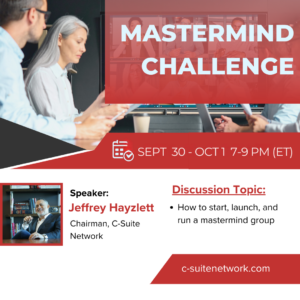C-Suite Executive Leadership Program
In today’s rapidly evolving business landscape, it is imperative for executives to continually engage in training, executive leadership programs, and mastermind groups, particularly with a focus on technology and artificial intelligence (AI). As C-suite leaders, staying ahead of technological advancements is not just a competitive advantage—it is a necessity for maintaining relevance and driving innovation within their organizations. By immersing themselves in cutting-edge training, executives can better understand the transformative potential of AI and other technologies, enabling them to implement strategic initiatives that foster growth and efficiency. Additionally, participating in mastermind groups provides a unique platform for leaders to exchange insights, challenge assumptions, and collaboratively solve complex problems, further enhancing their leadership capabilities. This continuous investment in personal and professional development not only solidifies their current roles but also positions them for future opportunities in an increasingly digital and AI-driven world. Embracing lifelong learning and leveraging the collective intelligence of peer networks ensure that executives are well-equipped to navigate the complexities of modern business and lead their organizations to sustained success.
Trending Executive Training Programs
Here are some of the primary considerations:
Diverse Skill Sets and Experiences: Participants value groups where members have varied backgrounds and expertise. This diversity can provide unique perspectives and solutions to problems.
Shared Goals and Interests: Members look for groups with common objectives, such as business growth, personal development, or specific industry challenges.
Accountability: Effective mastermind groups offer accountability mechanisms, helping members stay on track with their goals and commitments.
Supportive Environment: A positive, encouraging atmosphere is crucial. Members should feel comfortable sharing challenges and successes without fear of judgment.
Confidentiality: Trust is paramount. Members need assurance that discussions within the group remain confidential.
Structured Meetings: Regular, well-organized meetings with clear agendas and time management ensure productive sessions.
Access to Resources: Groups often provide access to valuable resources, such as guest speakers, industry insights, tools, and templates.
Networking Opportunities: Members appreciate the opportunity to expand their professional networks, potentially leading to new business opportunities, partnerships, and collaborations.
Facilitator Leadership: Effective mastermind groups often have a skilled facilitator to guide discussions, ensure participation, and maintain focus.
Feedback and Problem Solving: Constructive feedback and collaborative problem-solving are core benefits. Members seek honest insights and practical solutions from their peers.
Personal Growth: Beyond business goals, members look for opportunities for personal development, leadership skills enhancement, and mindset growth.
Commitment and Engagement: A high level of commitment and active participation from all members is essential for the group’s success.
By finding or creating a mastermind group that embodies these qualities, individuals can maximize the benefits and achieve their business and personal development goals more effectively.






